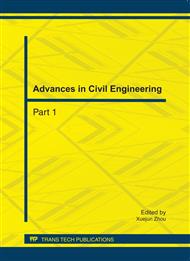p.940
p.946
p.951
p.958
p.964
p.969
p.975
p.979
p.983
Experimental Study on the Maximum Allowable Hydration Temperature for 900t Box Girder of High-Speed Railway
Abstract:
Due to the usage of high-strength concrete, excessive hydration heat is generated in the whole span box girder of high-speed railway. The maximum allowable temperature should not exceed 60°C according to the Technical Guide on Railway Bridge Construction of Passenger Dedicated Line. However, according to the field measurement and simulation to the maximum temperature of box girder concrete, we find that the maximum hydration temperature of concrete is generally more than 60°C which is the limited value of the specification. The research results show that the limited value of maximum hydration temperature for box girder concrete can be relaxed to 65°C.
Info:
Periodical:
Pages:
964-968
DOI:
Citation:
Online since:
September 2011
Authors:
Price:
Сopyright:
© 2011 Trans Tech Publications Ltd. All Rights Reserved
Share:
Citation:


